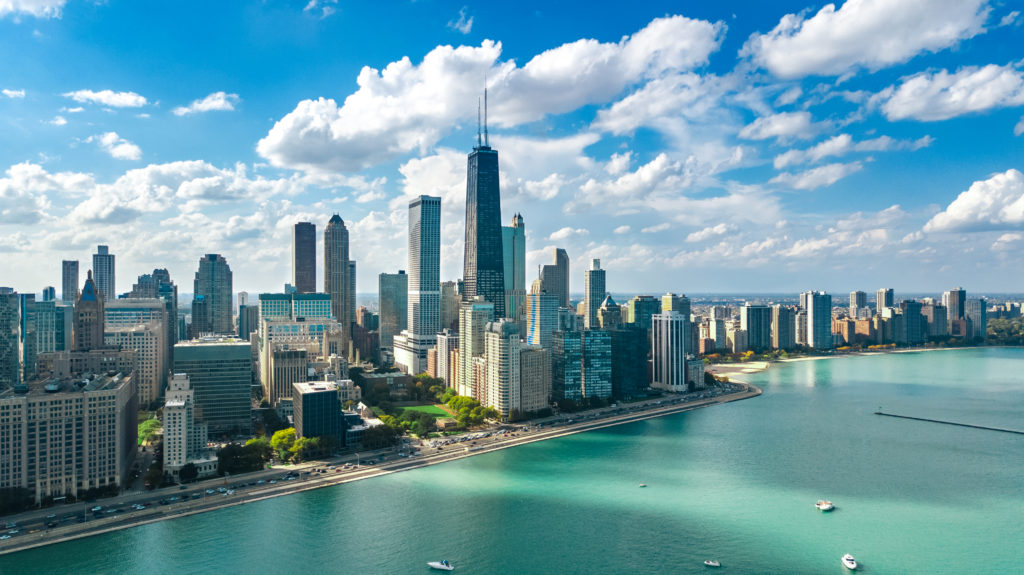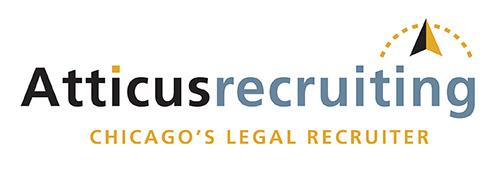Active in the Chicago legal community? Whether you’re a lawyer, paralegal or seeking a flexible, part-time legal position, a Chicago legal recruiter can help you land your legal industry dream role. With contacts at local law firms and corporations seeking legal counsel, legal staffing firms are often the first to know about the legal hiring needs at employers across the city. Thus, such firms are adept at introducing the area’s leading legal talent to local law firms, and vice-versa, when there is a fit tied to a particular practice area, legal specialty or experience level.
Verified Chicago Area Legal Recruiters
Atticus Recruiting is a Chicago-based legal recruitment agency, specializing in placing highly skilled and exceptionally well credentialed attorneys at top-tier law firms and coveted in-house positions throughout Chicago and across the Midwest.
Need Help Finding a Recruiter?
All Other Chicago Area Legal Recruiting Firms:
Job Opportunities

Affectionately called “The Windy City”, Chicago, Illinois, is a place that can put air in your legal career’s sails when it’s time for a change. As the 3rd most-populous U.S. city, Chicago’s metropolitan area includes over 10 million residents. Chicagoans are known for their tough, blue-collar work ethic that helps fuel the city’s global economy in sectors like finance, telecommunications, education, technology and transportation.
Chicago has over 22,000 lawyers that currently practice at its more than 4,500 law firms, 1000s of corporate counsel departments and 100s of government agencies. The average base pay for those attorneys is $104,974, and most seek career-enrichment opportunities through these professional organizations:
- Illinois State Bar Association
- Chicago Bar Association
- Cook County Bar Association
- 6 ABA-accredited law schools
- Numerous other state and local bar associations based on race, personal interests, practice specialties, religion, sexual orientation and other membership criteria
Requirements to Practicing Law
To earn a law license in Illinois, you must pass the state’s Bar Exam after graduating from an ABA-accredited law school. The cost is $950, and all applicants must also pass the Multistate Professional Responsibility Examination (MPRE). If you are already a licensed attorney in another U.S. jurisdiction who’s been practicing for 5 of the past 7 years, you can also file an Admission on Motion (fee: $1250) to the Illinois Bar if these additional requirements are met:
- You are a member in good standing of the current jurisdiction’s bar.
- You have been certified by the Committee on Character and Fitness.
- You have not failed the Illinois Bar Exam in the last 5 years.
All successful applicants must also be sworn in and complete a 6-hour Basic Skills Course and Mentoring Program. New lawyers must complete 20 hours of continuing legal education (CLE) within 2 years of being licensed. During the second 2 years, 24 hours of CLE are required, and then for each subsequent 2-year reporting period 30 CLE hours are needed. For each 2-year reporting period, a minimum of 4 CLE hours must be in diversity, civility, professionalism, legal ethics, or mental illness and addiction. For more details, visit: www.lawyeredu.org.
Why Chicago?
Chicago’s ethnically diverse downtown area on the shores of Lake Michigan is filled high rises,
theaters, sporting venues, 5-star restaurants and upscale shops. Thirty-five Fortune 500 companies have headquarters in the Chicagoland area, including Walgreen’s, Boeing, Exelon, Caterpillar, McDonald’s, Abbot Laboratories and United Continental Holdings. The city’s cost of living runs slightly higher than the national average due primarily to taxes and transportation, but lower healthcare, utility and grocery costs help offset those living expenses.
For those residing in and around Chicago, there are public transportation bus and light rail services available through the Chicago Transit Authority (CTA), including Park & Ride services from the suburbs. There are also 2 international airports serving the Chicagoland area. The Legal District is located near the lakefront and Loop right off I-90/94 and I-290, and many of the city’s lawyers live in its better neighborhoods, like North Center, the Loop, Lakeview, Lincoln Park and Edison Park.
In addition to its many parks, water-related activities and 6 professional sports teams, popular attractions include Wrigley Field, Shedd Aquarium, the Art Institute of Chicago, Millennium Park, Navy Pier, Lincoln Park Zoo and Museum of Science and Industry. Chicago has a 4-season climate, with July’s average highs of 84 degrees F making it the warmest month. January is the coldest month, with lows averaging around 20 degrees F, and the city does see an above-average amount of snowfall during a typical winter.
Employers
Competition for legal talent is fierce. Gain the advantage and hire with confidence.
Candidates
Your next big opportunity is here.
We can help you find it.
Frequently Asked Questions
The candidate pool in Chicago is highly competitive and diverse, reflecting the city’s rich educational and professional landscape. Graduates from top law schools like the University of Chicago Law School, Northwestern Pritzker School of Law, and Loyola University Chicago School of Law contribute to a well-qualified pool of candidates.
The city’s legal market attracts talent from across the nation, offering a mix of seasoned attorneys and fresh graduates. Chicago’s commitment to diversity is evident in its numerous professional organizations and initiatives aimed at supporting minority and female lawyers, ensuring a broad spectrum of perspectives and expertise within the candidate pool.
In Chicago, there is a high demand for legal positions in corporate law, healthcare law, intellectual property, and litigation. The city’s robust business environment, supported by major corporations and financial institutions, drives the need for corporate attorneys skilled in mergers and acquisitions, regulatory compliance, and contract law.
Healthcare law is also critical, given the presence of leading healthcare providers like Northwestern Medicine and Advocate Health Care, requiring expertise in regulatory compliance and medical malpractice. Additionally, the thriving tech and startup scene in Chicago increases the demand for intellectual property lawyers to protect innovations and manage IP portfolios. Other in-demand positions include real estate attorneys, employment law specialists, and litigators.
Several key industries shape the legal market in Chicago, including finance, healthcare, technology, and manufacturing. The finance sector, with major players like CME Group and Northern Trust, necessitates legal expertise in regulatory compliance, securities law, and mergers and acquisitions. The healthcare industry, led by institutions such as Rush University Medical Center and the University of Chicago Medical Center, drives demand for legal services in healthcare law, regulatory compliance, and litigation.
The technology sector, bolstered by a growing number of startups and tech companies, requires robust legal support in intellectual property, cybersecurity, and corporate law. Additionally, Chicago’s strong manufacturing base, including companies like Boeing and Caterpillar, creates a steady need for legal expertise in environmental law, labor relations, and commercial transactions. These industries collectively ensure a dynamic and evolving legal market in Chicago.
Current trends in Chicago are significantly impacting the legal field, particularly through advancements in technology, an increased focus on diversity and inclusion, and evolving business practices. The rise of legal tech startups and the adoption of artificial intelligence in legal research and document review are streamlining processes and improving efficiency.
Additionally, there is a growing emphasis on corporate social responsibility and sustainability, which drives demand for legal expertise in environmental law and corporate governance. The COVID-19 pandemic has accelerated the shift towards remote work, necessitating robust cybersecurity measures and changing how legal services are delivered. These trends are fostering a more dynamic, innovative, and responsive legal market in Chicago.
Remote work has become a significant aspect of the legal profession in Chicago, particularly following the COVID-19 pandemic. Many law firms and corporate legal departments have adopted flexible work arrangements, allowing attorneys to work from home or in hybrid models. This shift has led to changes in compensation structures, with some firms offering location-based pay adjustments and stipends for home office setups.
The average lawyer salary in Chicago is approximately $107,828, but this can vary widely depending on the practice area and level of experience. Remote work has also expanded opportunities for professional development and client engagement, as legal professionals can now participate in virtual conferences, webinars, and networking events, enhancing their skills and connections without geographical constraints.
Diversity and inclusion are increasingly prioritized in the Chicago legal sector. Numerous organizations and initiatives are dedicated to promoting inclusivity within the legal community. The Chicago Committee on Minorities in Large Law Firms works to advance diversity within major firms, while the Women’s Bar Association of Illinois and the Hispanic Lawyers Association of Illinois provide targeted support for women and minority lawyers.
Many law firms in Chicago have implemented diversity and inclusion policies, creating mentorship programs and encouraging inclusive hiring practices to enhance representation within their ranks. These efforts reflect a broader commitment to fostering an equitable and diverse professional environment, ensuring that lawyers from all backgrounds can thrive and contribute to the dynamic legal community in Chicago.

